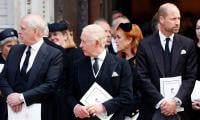Female Iran VP scolds hardliners over volleyball ban
TEHRAN: One of Iran’s female vice presidents launched a furious attack on Saturday on “sanctimonious” groups whose threats of violent confrontation at a volleyball match ultimately triggered a clampdown on women spectators.The remarks from Shahindokht Molaverdi, who had to backtrack on plans to ease restrictions on women at male sporting
By our correspondents
June 21, 2015
TEHRAN: One of Iran’s female vice presidents launched a furious attack on Saturday on “sanctimonious” groups whose threats of violent confrontation at a volleyball match ultimately triggered a clampdown on women spectators.
The remarks from Shahindokht Molaverdi, who had to backtrack on plans to ease restrictions on women at male sporting events, could inflame the government’s row with religious hardliners who oppose such reform.
Volleyball has become hugely popular in Iran as the national team has risen up the sport’s rankings and women were allowed to watch it until a ban was imposed in recent years.
The issue of female attendance peaked on Friday, before the first of two matches in Tehran against the United States in the sport’s World League.
The debate continued afterwards, somewhat clouding the home team’s easy 3-0 victory over its longtime political foe, but with whom a nuclear deal due by the end of this month could begin to repair relations.
Molaverdi, responsible for women and family affairs in the Islamic republic, last week said some female supporters would be allowed to watch the match. But security officials later contradicted her and said no attendance policies had been changed.
Following two small protests in the past week arguing against female admission, women’s rights activists used social media to voice frustration, posting on Twitter under the hashtag #letwomengotostadium.
Streets surrounding the Azadi Sports Complex were heavily policed on Friday, with officers forbidding women from going nearer the venue.
And although 200 special tickets for women were printed, an Iranian volleyball official told AFP the accreditations were not authenticated by security forces at the arena, and were thus invalid.
A few women pictured on social media watching the match were not Iranian, the Fars news agency reported on Saturday, but from the Russian, Italian and Hungarian embassies in Tehran.
In the aftermath, Molaverdi hit out at the curbs, writing on Facebook that the government had respected the views of religious leaders while trying to respond to “the legal demands of another section of society”.
She then cited unnamed groups, accusing them of “sparing no effort to spread the seed of despair.”
Such opposition came “from those who were denounced two years ago by voters, and who had crawled into their cave of oblivion for eight years”.
The comments, confirmed by Molaverdi’s office as genuine, suggested she was drawing a contrast between the plans of President Hassan Rouhani, regarded as a moderate, and the hardline two-term tenure of his predecessor, Mahmoud Ahmadinejad.
Recent days have seen female volleyball fans branded “prostitutes” and “sluts” on social media and on posters allegedly distributed in downtown Tehran.
Molaverdi said publication of such notices by “those who call themselves followers of God... and which used words that one loathes to repeat, clearly constitute several offences under the law.”
A “crowd of sanctimonious people who published one notice after another denouncing the modest and decent girls and women of this land” who “talked of confrontation used obscene and disgusting insults that only befit themselves,” Molaverdi wrote on Facebook.
“Even if one day our beloved girls and women forgive this crowd, they will never forget them and keep these days in their historical memory.”
Unlike football, women were allowed to attend male volleyball and basketball matches until a few years ago, and there is no need to change the law, Molaverdi added.
Earlier this month, Ansar Hizbullah, in Iran, said the government should reconsider its plans or face protests.
And in a sign of the tension, Ahmad Salek Kashani, head of parliament’s cultural commission, told Ansar Hizbullah’s weekly magazine: “Women who are allowed to enter the stadiums, what are they going to watch? Is it anything other than men’s bodies that have been left bare because of sports clothes?” A second match against the United States will take place on Sunday.
The remarks from Shahindokht Molaverdi, who had to backtrack on plans to ease restrictions on women at male sporting events, could inflame the government’s row with religious hardliners who oppose such reform.
Volleyball has become hugely popular in Iran as the national team has risen up the sport’s rankings and women were allowed to watch it until a ban was imposed in recent years.
The issue of female attendance peaked on Friday, before the first of two matches in Tehran against the United States in the sport’s World League.
The debate continued afterwards, somewhat clouding the home team’s easy 3-0 victory over its longtime political foe, but with whom a nuclear deal due by the end of this month could begin to repair relations.
Molaverdi, responsible for women and family affairs in the Islamic republic, last week said some female supporters would be allowed to watch the match. But security officials later contradicted her and said no attendance policies had been changed.
Following two small protests in the past week arguing against female admission, women’s rights activists used social media to voice frustration, posting on Twitter under the hashtag #letwomengotostadium.
Streets surrounding the Azadi Sports Complex were heavily policed on Friday, with officers forbidding women from going nearer the venue.
And although 200 special tickets for women were printed, an Iranian volleyball official told AFP the accreditations were not authenticated by security forces at the arena, and were thus invalid.
A few women pictured on social media watching the match were not Iranian, the Fars news agency reported on Saturday, but from the Russian, Italian and Hungarian embassies in Tehran.
In the aftermath, Molaverdi hit out at the curbs, writing on Facebook that the government had respected the views of religious leaders while trying to respond to “the legal demands of another section of society”.
She then cited unnamed groups, accusing them of “sparing no effort to spread the seed of despair.”
Such opposition came “from those who were denounced two years ago by voters, and who had crawled into their cave of oblivion for eight years”.
The comments, confirmed by Molaverdi’s office as genuine, suggested she was drawing a contrast between the plans of President Hassan Rouhani, regarded as a moderate, and the hardline two-term tenure of his predecessor, Mahmoud Ahmadinejad.
Recent days have seen female volleyball fans branded “prostitutes” and “sluts” on social media and on posters allegedly distributed in downtown Tehran.
Molaverdi said publication of such notices by “those who call themselves followers of God... and which used words that one loathes to repeat, clearly constitute several offences under the law.”
A “crowd of sanctimonious people who published one notice after another denouncing the modest and decent girls and women of this land” who “talked of confrontation used obscene and disgusting insults that only befit themselves,” Molaverdi wrote on Facebook.
“Even if one day our beloved girls and women forgive this crowd, they will never forget them and keep these days in their historical memory.”
Unlike football, women were allowed to attend male volleyball and basketball matches until a few years ago, and there is no need to change the law, Molaverdi added.
Earlier this month, Ansar Hizbullah, in Iran, said the government should reconsider its plans or face protests.
And in a sign of the tension, Ahmad Salek Kashani, head of parliament’s cultural commission, told Ansar Hizbullah’s weekly magazine: “Women who are allowed to enter the stadiums, what are they going to watch? Is it anything other than men’s bodies that have been left bare because of sports clothes?” A second match against the United States will take place on Sunday.
-
 Gigi Hadid Talks About 'relieving Tension' Amid Having Hashimoto's Disease
Gigi Hadid Talks About 'relieving Tension' Amid Having Hashimoto's Disease -
 Sarah Ferguson Is 'persona Non Grata', Prince William Makes It Clear To Everyone
Sarah Ferguson Is 'persona Non Grata', Prince William Makes It Clear To Everyone -
 Northern Lights Alert On Valentine’s Day: How, Where & Best Time To Watch Auroras
Northern Lights Alert On Valentine’s Day: How, Where & Best Time To Watch Auroras -
 Dennis Quaid Reveals What Keeps His Marriage To Laura Savoie Healthy
Dennis Quaid Reveals What Keeps His Marriage To Laura Savoie Healthy -
 Mustafa Suleyman Says Microsoft Is Building Its Own AI Superintelligence
Mustafa Suleyman Says Microsoft Is Building Its Own AI Superintelligence -
 Jessica Alba, Cash Warren Finalize Divorce After 16 Years Of Marriage
Jessica Alba, Cash Warren Finalize Divorce After 16 Years Of Marriage -
 China’s AI Boom Takes Center Stage At Spring Festival One Year After DeepSeek Stirred The Industry
China’s AI Boom Takes Center Stage At Spring Festival One Year After DeepSeek Stirred The Industry -
 James Van Der Beek Called His Sixth Child Jeremiah 'healing For Us' Before His Death
James Van Der Beek Called His Sixth Child Jeremiah 'healing For Us' Before His Death -
 Elon Musk Vs Reid Hoffman: Epstein Files Fuel Public Spat Between Tech Billionaires
Elon Musk Vs Reid Hoffman: Epstein Files Fuel Public Spat Between Tech Billionaires -
 Gordon Ramsay Denies Victoria Beckham Got Handsy With Brooklyn At His Wedding
Gordon Ramsay Denies Victoria Beckham Got Handsy With Brooklyn At His Wedding -
 Gordon Ramsay Makes Unexpected Plea To Brooklyn As He Addresses Beckham Family Feud
Gordon Ramsay Makes Unexpected Plea To Brooklyn As He Addresses Beckham Family Feud -
 Prince Harry Warns Meghan Markle To 'step Back'
Prince Harry Warns Meghan Markle To 'step Back' -
 Selena Gomez Explains Why She Thought Lupus Was 'life-or-death'
Selena Gomez Explains Why She Thought Lupus Was 'life-or-death' -
 New Zealand Flood Crisis: State Of Emergency Declared As North Island Braces For More Storms
New Zealand Flood Crisis: State Of Emergency Declared As North Island Braces For More Storms -
 Nancy Guthrie Case: Mystery Deepens As Unknown DNA Found At Property
Nancy Guthrie Case: Mystery Deepens As Unknown DNA Found At Property -
 James Van Der Beek's Brother Breaks Silence On Actor's Tragic Death
James Van Der Beek's Brother Breaks Silence On Actor's Tragic Death



